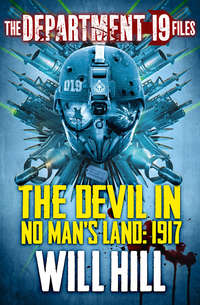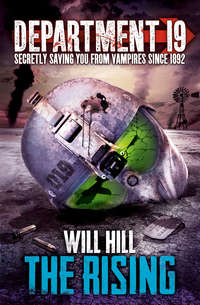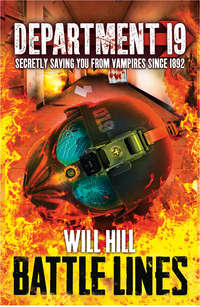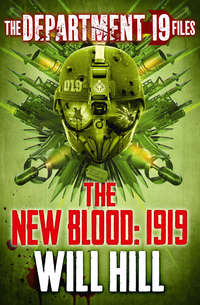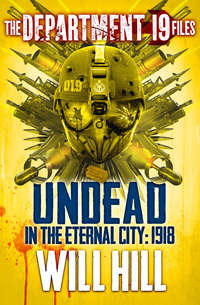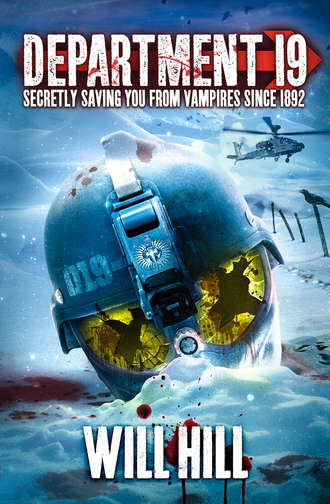
Полная версия
Department 19
The night manager had taken a step backwards. He took a handkerchief from his pocket and furiously dabbed his forehead with it.
“Sir, if you would spare the time to examine the dressing rooms,” he said, his voice catching in his throat. “Mr Irving informs me that the Prime Minister is most upset by this business, and I do not wish to tell him I have not exhausted all avenues of enquiry. Ten minutes, sir, I beseech you.”
Van Helsing looked at the small red-faced man before him, and felt his anger subside, replaced with a deep frustration. Nine months had passed since he and his friends had returned from the mountains of Transylvania, and although none of them had spoken publicly about what had happened, rumour of what had taken place beneath the stone peaks of Castle Dracula had spread, and he had found himself deluged with requests for help, with everything from creaking floorboards to ghostly apparitions and, it now appeared, missing chorus girls.
He longed for the quiet of his surgery, where his research into what he had seen in the East could continue. But there were worrying stories emerging from the Baltic, tales of blood and shadow. Thankfully though, nothing yet suggested that the evil condition which had caused the deaths of two of his friends had found its way back to London, and God was to be praised for that, if for little else.
“I apologise to you, Mr Stoker,” he said. “If you will lead the way, I will examine the dressing rooms, as you suggest.” He turned and spoke to his valet. “You may return to the carriage, boy. There is nothing here that will require your assistance.”
“Nonetheless sir, I will accompany you so long as it does not offend.”
Van Helsing waved a hand at him, dismissively. “Do as you wish.”
*
Stoker led them through the theatre, past the long rows of red velvet seats and the orchestra pit, through a door and into the backstage area. The narrow passages were piled high with props and set furniture from old productions – a wooden tower from Verona, a broken Faerie throne, ermine cloaks, rusting helmets and crowns, row upon row of daggers and swords, silver paint peeling from the wood and collecting in small drifts on the floorboards. As the night manager led Van Helsing and the valet through the dusty corridors, he talked non-stop, his confidence refuelled by the Professor’s apology and the contents of the small hip flask from which he was now openly taking regular sips.
“… of course Mr Irving is a great man, a truly great man, as fine an employer and as gracious a companion as he is skilled an actor. He has always encouraged the players to excel, to… improve, has given his time to tutor those with promise, and to always gently, most gently, discourage those without. My own small ambitions have always found a sympathetic ear with him, although of course he has so many more important claims upon his time, a great man, truly. He has promised me, one man to another, that he will read my play, should I ever complete the cursed thing. What kindness! What generosity! Although I fear I may never be able to accept his kind offer. The confines of the play confound me endlessly, and I am close to accepting that it may not be the medium to which I am best suited. Perhaps the novel holds the answer? I think it may do. Perhaps I should write of a theatre, from which people keep disappearing without a trace? That may entertain, if only for a short while. I may even presume to base the hero on Mr Irving, such a great man, such a—”
“Keep disappearing?” Van Helsing interrupted, his voice low.
They had reached a stop. The door in front of them led to a nondescript dressing room, barely larger than a pantry, in which stood three small desks, each facing a dusty mirror, and three hard wooden chairs. In the corners were piled costumes and pages of lyrics and dialogue.
“Sir?”
“Keep disappearing, you said. Are you telling me that this girl Pembry is not the first to vanish from the Lyceum without explanation?”
Stoker mopped his brow, the confusion clear in his face. “Well, yes, sir. There have been others. But as you yourself said, the theatrical life is not for everyone. Many choose to pursue their fortune elsewhere.”
“How many others?”
“In total, sir, I do not know. In recent months, four others, to the best of my knowledge. A trumpet player, an understudy to Titania, and two chorus girls whose names I must confess I do not remember.”
“Four others!” bellowed Van Helsing, cowering Stoker back against the open doorframe. “You are the manager of this theatre, five of your employees disappear in quick succession without an explanation between them, and you do not consider this unusual? And not worthy of mentioning to me, even after I was summoned here to investigate the most recent of them, even now not by you, but rather to satisfy the whim of a politician! Are you an imbecile, sir?”
Stoker stared back at him, his mouth hanging open. He closed his mouth, and muttered something too quietly to hear.
“What’s that, man? Speak up if you have something to say,” demanded Van Helsing.
“I’m only the night manager,” replied Stoker, in a small voice.
“That is no kind of excuse, no kind at all, and well you know it. Attend to me now: has anything notable occurred in recent months that coincides with these disappearances? Think now.”
Stoker turned away from Van Helsing, who looked over at his valet standing several feet away, his face expressionless. They waited for the night manager.
Eventually he turned back to them. His eyes were redder than ever, and a gasp in his breathing suggested he was close to weeping.
“I cannot recall anything of significance, other than the sad business of our conductor, Harold Norris.”
“What business?”
“Mr Norris suffered from a nervous disposition, sir. Six months ago Mr Irving granted him a leave of convalescence, in the hopes that an absence from the bustle of London would help with his condition. As I said, sir, Mr Irving’s generosity knows no—”
Van Helsing cut him off impatiently.
“What happened?”
“Sadly, Mr Norris died. He returned no better for his absence, complaining of fever and hunger, and then no more than two weeks after his return we received word from his brother that he had passed away. We have only just found a permanent replacement this past month.”
“Where did this Norris take his convalescence?”
“In Romania.”
The valet drew in breath. Van Helsing spoke in a voice full of menace. “Where did this conductor live?”
Stoker looked at him with open confusion.
“Sir, Harry Norris was a kind, gentle man of more than sixty years, and was with the Lyceum for at least twenty of them. He would not have hurt a fly, sir, I assure you. And even if I am wrong, the poor man is dead, and cannot possibly be involved with the disappearance that occupies us tonight.”
Van Helsing’s hand shot out from the folds of his cloak and gripped the night manager around his upper arm. Stoker cried out. “Where did he live?” the old man said.
“I don’t know!” the night manager pleaded. “Truly I don’t. He was always the last to leave the theatre, and he lived alone. Now, please, sir, release my arm, I beg you!”
Van Helsing let go of Stoker, who immediately grabbed his arm with his hand and looked at the old doctor with a look of pure terror.
“What is underneath this building?” Van Helsing asked.
“I do not know,” whispered the night manager, still clutching his arm.
“Perhaps it is time you found out. Take us to the orchestra pit, quickly now.”
“It’s this way,” Stoker said, his voice still low and full of fear and pain, and led them into the bowels of the theatre.
Their second journey through the backstage of the Lyceum was silent.
The night manager led them through corridors of dressing rooms, past a large door separate from the others upon which was written Mr H. Irving in elegant script, past doors marked MAKEUP, ATELIER, BRASS, WIND, PERCUSSION and PRIVATE, down a narrow staircase and finally through a door that opened into the rear of the orchestra pit. Van Helsing placed a hand on Stoker’s shoulder and entered the pit first, walking quickly through the neat arrangement of chairs and stands, up two shallow wooden steps to the entrance to the conductor’s box. He stayed on the top step, not entering. The valet and the night manager stood behind him on the floor of the pit.
In the box was a circular red rug that covered the floor, an ornate music stand holding the score for The Tempest, and nothing else. Van Helsing ordered Stoker and the valet to stand back. He reached in and gripped the edge of the red rug and then pulled it violently out of the box.
“Sir, I must protest!” cried Stoker. “This is most—”
“Come up here,” interrupted Van Helsing. “And see if your objection still holds.”
Stoker and the valet stepped up into the conductor’s box. In the middle of the floor was a heavy wooden trapdoor.
Van Helsing turned to the night manager and the valet.
“Be very, very careful from here on,” he said.
Chapter 7
IT’S HARD TO BREATHE WITH A HAND AROUND YOUR THROAT
The lighting in the dormitory switched to a purple ultraviolet as the alarm hammered into Jamie’s skull. Frankenstein pulled a radio from his belt and keyed in three numbers. He held the radio to one ear, placed a giant hand over the other, and listened.
“What’s going on?” Jamie yelled. Frankenstein held a hand out towards him and turned away, his ear hunched into his shoulder, trying to hear what was being said on the radio.
Jamie looked around. There was a door in the wall to his left, and he ran towards it, desperate to get away from the noise that was making his head swim and his stomach churn, desperate to get away from this place and find his mother. Frankenstein reached out and grabbed for him but Jamie saw it coming, slipped around the outstretched fingers, shoved the door open and ran through it.
He had just enough time to register that he was in a long grey corridor before something crashed into him and he sprawled across the smooth floor. His head cracked the ground hard, and he saw stars as a voice shouted at him, and he sat up.
“What the hell are you playing at?” A short, overweight man in a white doctor’s coat was standing over him with a look of extreme annoyance on his face. “Who are you? What are you doing here?”
“I’m Jamie Carpenter,” he shouted. “Can you tell me where I am? Please?”
“What did you say your name was?” the doctor yelled, his eyes wide.
Jamie repeated it.
“Christ. Oh Christ.” The doctor looked around, as if he hoped there would be someone to tell him what to do. “You’d better come with me,” he eventually yelled, extending a hand towards Jamie. “Seward’ll skin me alive if anything happens to you. Come on, on your feet.”
Jamie hauled himself upright.
“Where are we going?” he yelled.
“Arrivals,” the doctor yelled back. “Something’s inbound, so it’s the safest place for you to be.”
“Why?”
“Because it’s where the guns are.”
Jamie ran down endless corridors, his head ringing with the relentless wail of the alarm and the thumping strobe of the purple lights. The doctor was short and round but he ran with a grim determination, his jaw clenched, his eyes staring into the middle distance, and Jamie found himself sprinting just to keep up.
The doctor finally stopped running in front of a wide lift platform, little more than a steel frame striped black and yellow. Jamie stepped on to it, the doctor pushed a button set into one of the metal columns, machinery far above them ground into life, and the platform began to ascend. Its passengers doubled over, hands on their knees, trying to catch their breath.
Jamie pulled air into his lungs and stood up straight. As he did so, they passed a cavernous open floor, in the middle of which hulked a vast angular shape, purple track lighting on the walls and floor illuminating tantalising details: three huge sets of wheels, a dark triangular fuselage, and two wide wings that stretched almost to the walls. Jamie crouched down as they rose towards the ceiling, but the shape disappeared below him as the lift continued its ascent.
“What was that?” Jamie asked.
“Don’t you worry about that,” wheezed the scientist in reply. “You keep your eyes in this lift.”
Jamie looked at him, then shrugged and turned away.
Fat idiot. Don’t tell me where I can’t look.
Gears crunched above his head and the lift started to slow. They were rising through a dull grey shaft, which suddenly opened out into a wide room, full of movement and noise.
One whole side of the vast semi-circular room was open on to a wide tarmac area that led out to the middle of the long, brightly lit runway. Inside, two lines of black-clad figures, eight wide, were stood facing the huge open doors, submachine guns set against their shoulder, pointing out into the darkness. A chill ran up Jamie’s spine when he saw them.
I’ve seen people like this before. They look like soldiers, they look like the men who—
He couldn’t let himself finish the thought. He looked away from the dark figures, and saw the round crest he had seen in the white corridor, stencilled high on the huge hangar wall. The same three Latin words were stamped below it, running almost the entire length of the vast surface.
Lux E Tenebris
Behind the rows of soldiers, dozens of white-coated men and women bustled across the vast concrete floor of the room – hangar, it’s a hangar, they don’t make rooms this big – shuttling stretcher trolleys and IV drips back and forth, shouting instructions and questions to one another. A steel shutter door slid upwards to Jamie’s right and four figures in full biochemical hazard suits pushed a pair of metal trolleys covered in plastic oxygen tents into the hangar.
In the distance, Jamie heard the heavy thud-thud-thud of an engine.
“Incoming!” yelled one of the soldiers.
“How much time?” asked a tall, skeletally thin man stood behind a portable computer array on a heavy steel trolley.
“Ninety seconds!”
The activity in the hangar accelerated, doctors and scientists and soldiers running in every direction, the heels of their shoes and boots drumming on the concrete floor.
A huge crash boomed out to Jamie’s left, and he jumped. A heavy metal door had thumped open, slamming against the wall with a deafening clang. Frankenstein thundered through the door, his huge head surveying the room. His eyes locked on Jamie’s; he smiled a smile with absolutely no humour in it, and came towards him.
Jamie stood frozen to the spot as Frankenstein crossed the hangar in a dozen of his giant strides, grabbed him by the neck of his T-shirt and lowered his enormous head down so they were face to face. His mouth was set in a spirit-level-straight line, his jaw clenched, deep breaths blasting out of cavernous nostrils and blowing the hair from Jamie’s forehead.
It’s trying hard not to kill me. Really, really hard.
Frankenstein’s wide misshapen eyes, the pupils slate grey, stared into Jamie’s. Eventually, the monster spoke. “That will be the last time you run away from me,” it said. “Do you understand?”
“I—”
“Say nothing,” Frankenstein roared. “Not a word. Nod if you understand. I don’t want to hear your excuses. Do you understand?”
Jamie nodded, then turned his head away, tears of shame and humiliation coming to the corners of his eyes. Several of the troops and doctors had stopped what they were doing and were watching the confrontation, even as the blinding lights of a helicopter illuminated the wide landing zone beyond the hangar doors; Jamie could no more meet their stares than he could that of the giant in front of him.
Movement in the corner of the hangar caught his eye. A section of the blank concrete wall slid aside, and four black-clad figures emerged. They wore large black machine pistols on their right hips, short black tubes on their left, from which wires ran to shallow square tanks on their backs. Jamie recognised the tubes immediately – they were a smaller version of the weapon he had seen Frankenstein fire in the living room of his mother’s house.
My God, this is all really happening. I’m not going to wake up.
My mother is really gone.
The four soldiers emerging from the hidden corridor took up positions, two on either side of the door, and a figure strode quickly out of the darkness, through their guard, and headed towards the giant open side of the hangar. The newcomer was dressed in the same sleek black gear as the others, but without the deep purple visor. Jamie saw a flash of grey hair, swept back from the man’s forehead. As he strode across the concrete floor he cast his eyes quickly around the hangar, and they met Jamie’s. Surprise rippled across the man’s face. He turned to one of the soldiers, said something, then marched across the hangar towards Jamie.
“Victor!” the old man shouted, crossing the distance rapidly. Frankenstein looked round, saw him coming, and swore under his breath. Then he looked back down at Jamie, his eyes clearing, as though he had forgotten he was holding a teenage boy by the neck of his T-shirt, and swore again, loudly this time.
He’s not really angry with me. It’s something else. He looks scared.
Frankenstein released Jamie and told him to stand up straight. Jamie did so, grudgingly, as the old man arrived before them.
“Victor,” he said again. “Can you explain to me why there is a civilian teenage boy inside the most classified building in the country? I hope you can, for your sake.”
Frankenstein stood straight as a board, towering over both Jamie and the old man.
“Admiral Seward,” he said, from above their heads. “This is Jamie Carpenter. I pulled him out of his house as Alexandru was about to tear out his throat, sir. His mother is missing, sir. And I didn’t know where else to take him, sir.”
Seward did not appear to have heard anything after Jamie’s name. He had recoiled, visibly, when he heard it, and now he was looking at the boy with a look of complete surprise.
“Jamie Carpenter?” he said. “Your name is Jamie Carpenter?”
“Yes,” replied Jamie. He was beyond confusion now, and when Frankenstein barked at him to say sir, he added “Yes, sir” without objection.
Admiral Seward was rallying, his composure returning.
“Ordinarily, I would tell you it was a pleasure to meet you,” he said to Jamie. “But this is not an ordinary night, nor has it been an ordinary day by the sounds of it. And you...” He trailed off, then regrouped. “I would like to see you in my quarters, Mr Carpenter, when this matter is resolved. Victor, will you escort him?”
Frankenstein agreed that he would, and then the helicopter landed outside the hangar doors and everything started to happen very quickly.
*
As its rotors began to wind down a door slid open in the sleek metal side of the chopper and a black-clad figure jumped down on to the concrete and waved an arm, beckoning the scientists forward. As white coats rushed across the landing area, the soldier reached up into the belly of the helicopter and helped a man in a biohazard suit down to the ground. The hood of the suit had been removed, and the arm was torn open. Blood, sickeningly bright under the yellow-white lights of the helicopter, shone through the hole. The soldier threw the man’s other arm around his shoulders and half walked, half dragged him towards the hangar.
Admiral Seward strode out to meet them, his voice loud above the rapidly declining helicopter.
“Report,” he demanded.
“Sir, his pulse is weak, his leukocyte count is through the floor. Sir.”
As the soldier gave his summary the scientists in their biohazard suits arrived beside him, pushing a stretcher. They unwound the injured man’s arm from the soldier’s shoulder and lifted him on to it.
Admiral Seward turned and watched as the scientists, almost running, wheeled the stretcher back across the hangar and through a heavy metal door marked with yellow warning triangles, then turned his attention back to the helicopter, from which more figures were emerging.
A second soldier and a woman in a biohazard suit leapt down from the chopper and pulled a plastic-covered stretcher out after them, extending its wheels and rolling it towards the hangar door. Even from his vantage point at the back of the hangar, Jamie could see that this stretcher wasn’t empty. There was a dark shape lying under the plastic, spotted with red.
“Stand aside,” Seward yelled as the stretcher approached the crowd of gawping men and women. “Clear a path, for God’s sake.”
He strode around in front of the stretcher and led it towards a pair of double doors, directly past Jamie. He stepped forward to take a look, and felt his heart lurch. Lying beneath the plastic sheeting was a teenage boy, his skin pale, his breathing so shallow it was almost nonexistent, a huge wad of bandages pushed gruesomely deep into a wide hole in his throat.
Jesus, he’s my age. What happened to him?
Then the boy was gone, rushed towards the hangar exit by running doctors. Jamie stared after the stretcher, fear crawling up his spine as reality crashed into him.
That could have been me.
There was a commotion out by the helicopter. A second stretcher was being unloaded from the chopper’s belly, and this one was also occupied.
Jamie pushed forward through the crowd of soldiers and scientists, meeting the stretcher as it arrived at the vast open hangar doors. He looked down, then took a stumbling step backwards, his heart in his mouth.
Staring straight up at the distant ceiling of the hangar, her face set in a grimace of pain, was the girl from the park, the girl who had attacked him only hours earlier.
The girl whose face he had seen in the window the night his father died.
He gasped with shock, and she turned and saw him. She smiled. “Jamie... Carpenter,” she said, her voice cracking, but sounding oddly as though she were trying to smile through the pain. The stretcher lurched to a halt, and the scientist pushing it stared at Jamie.
“How does she know you?” he asked, his voice dripping with suspicion, and more than a little fear. “Who the hell are you?”
Jamie looked blankly at him, trying to think of how to answer such a question, but then the girl spoke again, in a voice too low for Jamie to hear.
He leant down towards the plastic tent.
“What did you say?” he asked. Behind him he heard Seward’s voice asking what was happening, and then Frankenstein saying his name, his voice loud and urgent. He didn’t care. There was something beautiful about the girl’s brown eyes, even through the heavy plastic sheeting, and he leant even closer, and repeated his question.
“Your... fault,” the girl said, then broke into a wide smile, all traces of pain suddenly gone from her face.
A hand gripped his shoulder, and he knew without looking that it belonged to Frankenstein. But before he had time to move the girl sat upright, dizzyingly fast, with the plastic tent still covering her, and threw herself at Jamie.
She crashed into him, chest high, and he was knocked flat on his back. His head thudded against the concrete floor, sending a bright pillar of pain shooting into his brain. The girl landed on him, straddling his waist, the awful smile still on her face. Jamie saw Frankenstein grab for her neck with his gloved hands, but she swung a plastic-coated arm and sent the huge man sprawling backwards. The backs of his legs collided with the fallen trolley that had been occupied by the girl and he went over it, his head smacking hard on to the ground.
Jamie saw this happen through a thick fog of pain, his eyes trying to close, a deafening high-pitched sound ringing through his head. The girl lunged forward, still covered in the plastic sheet, opened her mouth, then buried her face in his neck.



